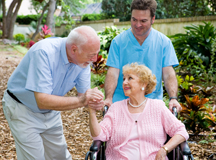Caregiver Corner
Frequently Asked Questions
- The Montana Respite Coalition defines respite as “planned or emergency care provided to an individual with need of support and supervision in order to provide temporary relief to the primary caregiver of that individual.”
- A caregiver gets a break from their daily routine.
- At any time in our life, we may find ourselves in situations where we may be the one being cared for, or we may be the primary caregiver or we may be the person wanting to help the caregiver.
- Be Prepared: When a family member needs care, time is spent managing one moment to the next. It’s hard to carve out the time needed to really explore and research care options. Gather information early on and as soon as possible, so that you have options and choices available when needed
- Be Honest: You may find yourself in a position where you want to be everything to everyone: supportive spouse, nurturing parent, devoted caregiver, responsible employee, dependable friend, valuable volunteer. Trying to do it all means you get lost in the shuffle – something has to give. It’s essential to set realistic limits on your abilities, respect your boundaries and welcome the best help possible.
- Be Well: Caregiving, which can be a long-term commitment, will take its toll. Maintaining a semblance of yourself outside your role, even if only for a few moments each day, and enjoying a true support system helps you stay well. In all you do, one priority stays constant: Your own health.
- Ideally respite should be a natural part of caring for a loved one to prevent stress or burnout. If the following symptoms occur, do not hesitate. Seek help now!
10 Symptoms of Caregiver Stress
- Denial about the situation or condition of the person you care for.
- Anger at the person you care for, at others or at people that don’t understand the situation.
- Social withdrawal from friends and activities that once brought pleasure.
- Anxiety about facing another day and about the future.
- Depression that begins to break your spirit and affects your ability to cope.
- Exhaustion that makes it nearly impossible to complete necessary daily tasks.
- Sleeplessness caused by a never-ending list of concerns.
- Irritability that leads to moodiness and triggers negative responses and actions.
- Lack of concentration that makes it difficult to perform familiar tasks.
- Health problems that begin to take a mental and physical toll.
Regardless of our role, caregivers need respite.
- It's OK to need it!
- To keep the energy going
- To give everyone a break, including the person you are caring for
- To keep crisis down to a minimum
- To maintain your emotional and physical health and well-being
- To respond to the emotional and physical health and well-being of the person receiving care
- To help you recognize your own limits
- To realize that feeling guilty when asking for help is normal but there are people in the community that provide respite and they are trained to do it.
- It's OK to want it!
- Everyone deserves a break
- You may not be the only one that wants a break
- It’s okay to seek help from family members, involved parties and to seek help from the community and professionals
- You need to take a break when you need a break
- It's OK to get it!
- It doesn’t always have to be paid care by a professional
- It can be signing your child up for baseball
- It can be taking your parent to the senior center for bingo
- It can involve reaching out to professional agencies in your community such as city-county health departments, day cares, developmental disabilities service providers, social workers/care coordinators/patient navigators from medical facilities, county extension services, mental health centers, a community resource directory, the Area Agency on Aging, a senior center.
- It can involve checking with community supports such as churches, youth organizations, community service organizations
- It can be someone dropping off dinner or a neighbor shoveling your driveway
- It can be “just being there”
- Caregiving: Be Prepared; Be Honest and Be well
Caregiving.com website - How To Be a Healthy Caregiver
- Understand what's happening as early as possible
- Know what community resources are available
- Become an educated caregiver
- Get Help
- Take care of yourself
- Manage your level of stress
- Accept changes as they occur
- Make legal and financial plan
- Give yourself credit, not guilt
- Visit your doctor regularly
- For more information on healthy caregiving, visit one of the following website:
- Family Caregiver Stress Relief - CaregiverStress.com
- " Taking Care of Yourself" - alz.org | Alzheimer's association
- Caregiver Self-Assessment for the Caregiver of a Veteran Needing Long-term care
- Caregiver Strain Index
- Caregiving 101: The Everything-You-Need-To-Know Guide for Family Caregivers
If you are hiring a caregiver on your own, you may want to use some of the following interview questions to narrow the candidates. Consider first screening the applicant over the phone; then decide if you will meet in person. Some suggested questions include:
- What experience do you have?
- Do you have a driver’s license and a good driving record?
- Will you be working in another job(s) that affect your availability? Are you available on the weekends?
- What training have you had to be a caregiver? CPR? First Aid?
- Provide a list of expected caregiving related duties. Ask if there is anything on the list that concerns them. Give an example of an experience you have had as a caregiver, ask the applicant how they would respond to the situation.
- Have you ever cared for someone with my family members’ healthcare needs? (Provide specific examples)
- Are you willing to submit to a background check?
If you are using an agency to hire a paid caregiver, find a qualified, reputable agency, consider asking these questions:
- What are the hiring requirements for perspective employees?
- What screenings and background checks are done before an individual is hired? (Criminal background check – state and federal; drug screening?)
- How does the agency access what the caregiver is capable of doing?
- Does the agency train caregivers?
- Does the agency send the same caregiver?
- What level of supervisor is provided to evaluate the caregiver?
If you are planning to compensate a family member or a friend as a caregiver, it is important to have a written agreement setting forth expectations. These written agreements are known as by various titles including: Caregiver contracts, Elder care contract, or Family care contract. A signed, written agreement is important because it identifies what services or tasks are expected in return for an identified amount of compensation. Any agreement should be discussed with all family members and should be transparent.
Basic components of a Caregiver contract should include:
- The caregiver contract is in writing, signed and dated.
- Payment is for care provided in the future (not for care or services already performed)
- Compensation for care must be reasonable. This means it should be no more than what would be paid to a third party for the same care in your geographic area.
Caregivers will be required to pay applicable federal, state and employment taxes on the income earned.
Sample Caregiver Contract
Caregivers should maintain a daily log with the dates and times services are provided.
In the event, the care receiver may need to enter a long-term care facility or apply for services that Medicaid may pay for, the Caregiver Contract and the daily log become important documents for the Office of Public Assistance. The Deficit Reduction Act of 2005 changed the Medicaid "look back" period on a person's spending and assets to five years for determination of Medicaid eligibility.
- Ask about changes in symptoms, medications or general health of the care recipient
- Ask what specific things you need to provide care
- Ask what medications have been prescribed and what is needed to help manage medications (storage of medications; when and how it is given; side-effects of medications; etc)
- Ask about changes in symptoms, medications or general health of the care recipient
- Discuss your comfort in your caregiving situation
- Ask what specific help you need to provide care
- Tell the doctor about any changes in behavior, eating, sleeping or other daily activities
- Tell the doctor what you need to know to help you in caregiving
- For more information on each of these items, go to www.nia.nih.gov to get a copy of the booklet titled, “Talking with your Doctor.”
- If you are not able to visit regularly, arrange for regular contact by telephone or Skype.
- Plan regular check-in times
- Enlist the support of local friends and natural supports
- Obtain local community resource information
- Consider a care manager
For more information on caregiving long distance, go to www.nia.nih.gov to get a copy of the booklet titled, “So Far Away: Twenty Questions and Answers About Long-Distance Caregiving”
- Remove or secure tripping hazards like small rugs and telephone cords
- Keep floors and stairways free of clutter
- Have good lighting
- Always use handrails that are firmly attached.
- Use grab bars in the bathroom
- Make wide pathways throughout the house
- Make sure pathways and decks have non-slip surfaces
- Install and make sure smoke detectors are working
*Note: The local fire department and utility company will do a free check of homes and apartments for safety issues.
- For more information on each of these items, go to www.journeyworks.com, “Stress and the Caregiver” pamphlet.
- Consider periodically taking the Caregiver Strain Index
- Tips for Family Caregivers at www.caregiverstress.com
- Lifespan Respite Voucher Program
- Dementia/Alzheimer's Voucher Program
- It can be free by using volunteers or natural supports (neighbors, friends, church, youth groups, etc.)
- Sometimes you pay for it
- Medicaid Waiver funding* (if eligible)
- Disability Services Division
- Developmental Disabilities Program
- Children’s Mental Health Bureau
- Senior Long Term Care Division
- Aging Services Bureau
- Community Services Bureau
- Child & Family Services Division
- Addictive and Mental Disorders Division
- Veterans Affairs
- Tribal Entities
- Family Caring for Family
- Caregiving Training Topics
- Caregiver College Series (Family Caregiver Alliance)
- Video Training for Caregivers of loved ones with Alzheimer's/Dementia - Teepa Snow
- Grandparent's Raising Grandchildren - MSU Extension
- Alzheimer's Caregiving: NIH Senior Health
- Next Step in Care training video
Alzheimer's Association - I Have Alzheimer's Disease
Alzheimer’s Association Helpline (800) 272-3900 (24/7)
Area Agencies on Aging (800) 551-3191 (M-F 8 AM-5 PM)
Montana Aging & Disability Resource Center
Montana Alzheimer’s Disease & Related Dementias Workgroup



